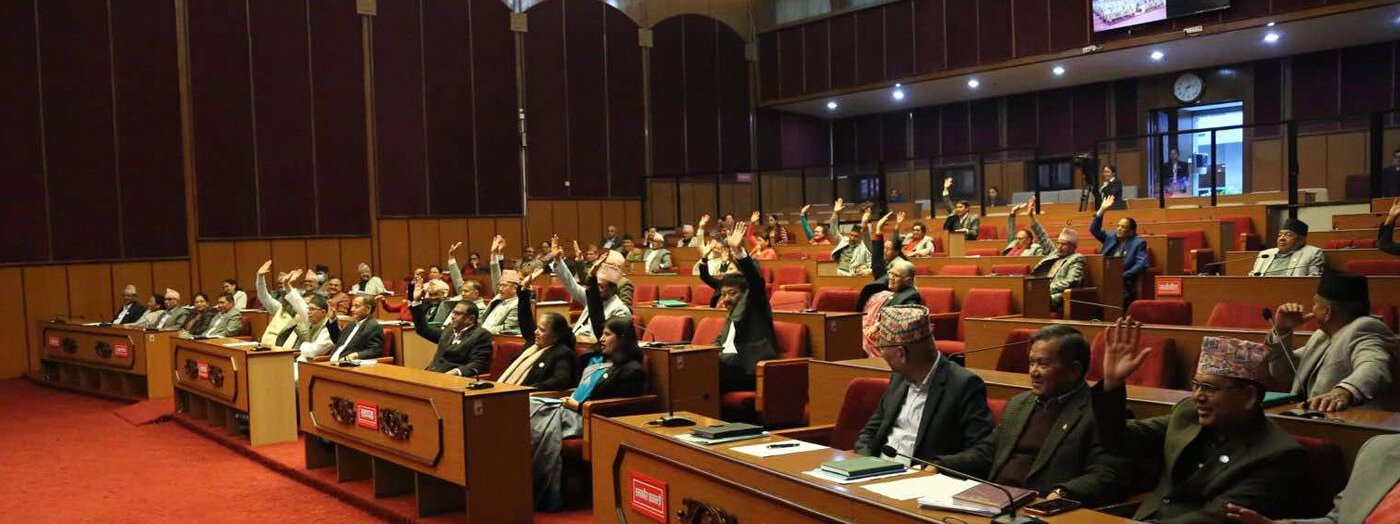Nepal’s milestone on Dignified Menstruation: A case study in policy change and advocacy

- Published On
- 21 May 2025
- Published By
- MenEngage Alliance
- Reading Time
- 4 minutes
- Resource Type
- Story
In a landmark moment for gender justice in Nepal, the National Assembly unanimously endorsed a resolution motion on dignified menstruation on the 21st of March 2025. The motion on ending menstrual discriminations, led by parliamentarian Garima Shah, marked a significant policy step in formally recognizing menstrual discrimination as a form of gender-based violence, a constitutional and human rights violation.
“It took more than three decades to get here,” says Dr Radha Paudel, founder of the Global South Coalition for Dignified Menstruation (GSCDM), a member of MenEngage Alliance who has been at the forefront of this historical achievement.
Understanding the context and challenges
Around the world, menstruation is subject to widespread and multi-faceted discrimination. From childhood, menstruators often have to deal with stigma, shame, taboos, social exclusion, restricted access to essential services and resources and other forms of unequal and unjust treatment. In both subtle and explicit ways, these experiences shape the lives of menstruators and reinforce systems of inequality.
Nepal is no exception. As a child, Radha witnessed her mother’s experience of menstruation: being cast out from daily life, denied certain foods, and shamed for bleeding “dirty blood”.
“I used to pray to change my sex or stop my menstruation,” she recalls. “I was shocked and traumatised”.
After suffering from these early experiences, Radha committed to a lifelong mission to dismantle the systems that treat menstruation as something impure or shameful.
The advocacy process
Radha’s personal experiences reflect a wider, systemic problem that affects menstruators everywhere, and remains unaddressed in both global and national policies and institutions. Her commitment to challenging menstrual injustices led to the founding of the Global South Coalition for Dignified Menstruation (GSCDM), the global network behind this significant moment of political recognition and progress for menstrual dignity in Nepal and beyond.
Dignified Menstruation refers to a “decolonized, transformative, holistic, human rights-based framework that envisions a world where all menstruators live free from any form of menstrual discrimination at home, school, community, workplace, and everywhere” - as defined by the GSCDM.
This approach demands a shift from the dominant narrative which centres products and hygiene-focused responses to a dignity-centered, lifecycle approach which addresses the underlying social norms and structural inequalities that perpetuate menstrual discriminations. This framework also includes centering the voices and needs of menstruators who are often excluded — such as those with disabilities, LGBTQIA+ individuals, and people living in pandemics and remote or conflict-affected areas.
For decades, Radha and her colleagues have been working hard to make this vision a lived reality through education, research, global advocacy, and community dialogues with youth, religious leaders, the media and many other sections of society. Recognising that policy change could significantly support the rights and dignity of menstruators, they also worked to bring menstrual dignity into the national policy agenda.
The GSCDM led a sustained process of engagement with parliamentarians from both houses of Nepal’s Parliament, organising a series of interaction programmes that helped build momentum for policy change. This engagement included direct collaboration with lawmakers in the drafting, review, and formulation of policy proposals.
After years of ongoing partnership, parliamentarian Garima Shah ultimately tabled the motion on the 21st of March 2025, voicing her frustration with the language and national policy inadequacies regarding menstruation.
“The SRHR policy, the ending child marriage strategy, the Domestic Violence Act, Child Rights — none of these policies mentioned menstruation discrimination,” Radha pointed out.
In total, eighteen members of the National Assembly stood in support of the proposal, leading to its unanimous adoption by the Upper House.
Radha recalls:
“We were there, in Parliament, when it happened. It was an historical moment.”
What comes next
This resolution is a major victory, but Radha is clear that the work is far from done. “We know we have a long way to go,” she reflects:
“We need to craft the policies, we need to educate people from all different walks of life… but this resolution is a model. It shows the global community the way forward and it sends a clear message: that every menstruator deserves dignity.”
The next phase involves ensuring that the principles of dignified menstruation are embedded in policies globally, holding institutions accountable for implementation, ensuring schools and communities are educated in challenging menstrual discriminations. Radha stresses that this cannot be achieved alone. Throughout this journey, building solidarity and collaboration has been essential. Radha points to the long-standing relationship with MenEngage Alliance as an example of shared purpose and solidarity across movements.
“MenEngage Alliance has been our collaborator since the beginning. We are very happy and proud to have MenEngage Alliance with us, to be working together side-by-side”
Speaking on the critical role of non-menstruators in the Dignified Menstruation movement , Radha pointed out that “We always believe they are our partners.” Radha emphasized that:
“Menstrual discrimination helps build and uphold patriarchal power. That’s why non-menstruators, including men and boys, have to be advocates for dignified menstruation, uphold accountability measures and use their platforms to bring lasting change in society.”
Looking ahead to the global conference
This policy achievement comes just as GSCDM is preparing to host the Learning Conference on Dignified Menstruation, this December in Kathmandu. The three-day conference aims to bring together all interested individuals, organizations, and networks to shape the journey of dignified menstruation for dismantling systemic inequalities and patriarchy which are deeply embedded in menstrual discrimination. Additionally, this event will celebrate the 7th International Dignified Menstruation Day. It will be a space to reflect, celebrate, and strategize.
MenEngage Global Alliance is proud to co-organize this event and invites all interested gender justice advocates to participate. Applications are open until June 15 for those wishing to apply as participants, presenters, moderators, exhibitors or partners in shaping a future free from menstrual discrimination.

